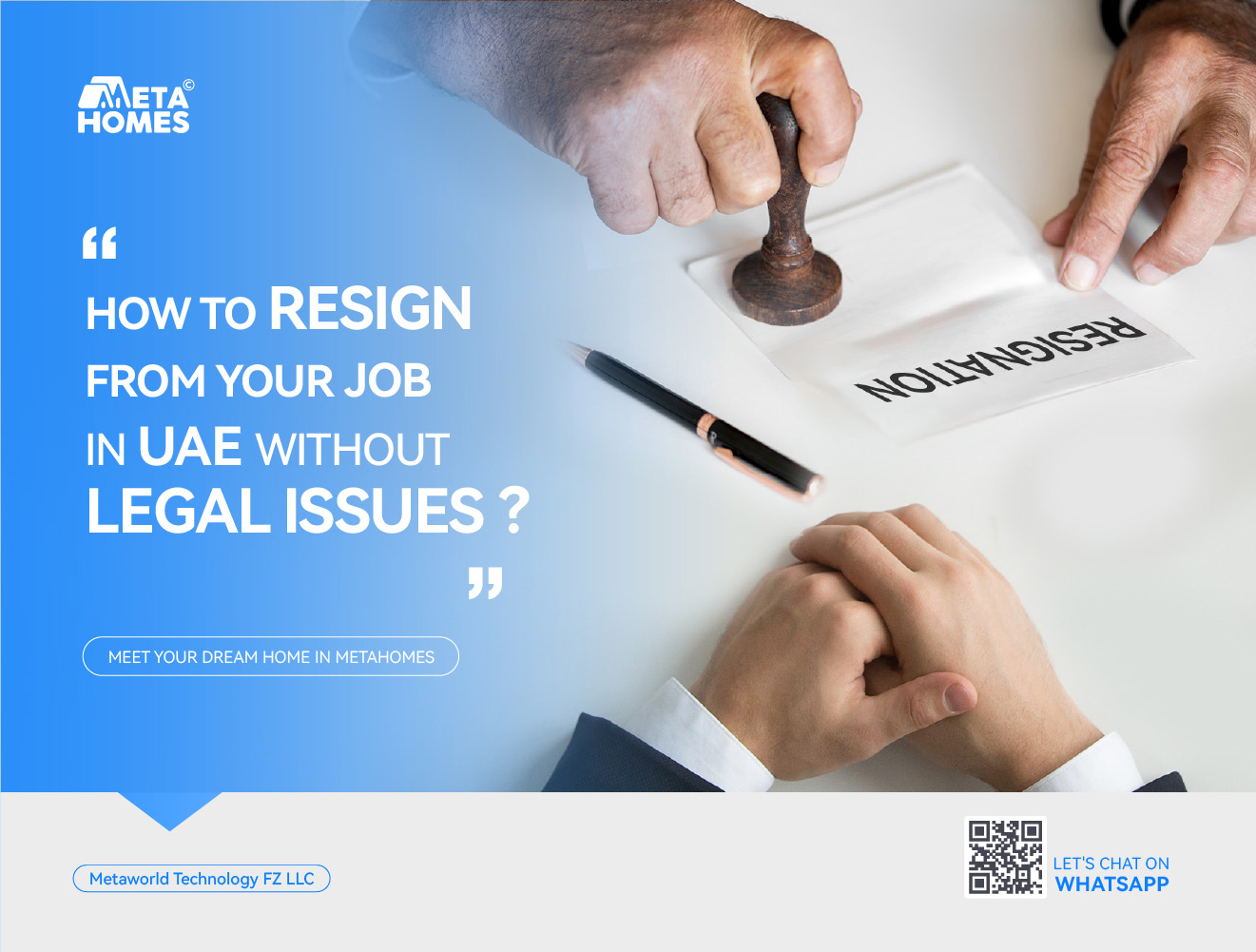
Resigning from a job in the UAE is a big decision requiring planning and understanding the country’s labor laws.
UAE labor laws are designed to balance the rights and responsibilities of both employer and employee. Knowing these laws is key to a smooth and amicable exit from your employer.
1. Understanding UAE Labor Law
The UAE has a comprehensive legal framework that regulates employment relationships.
These laws are meant to protect both employer and employee to ensure fairness and clear guidelines for every stage of employment.
Whether you are local or an expat, it’s important to know your rights and obligations.
Key Points Under UAE Labor Law:
- Notice Period: Most contracts have a notice period, generally 30 to 90 days, depending on your employment type (limited or unlimited).
- End-of-Service Benefits: Employees who have completed at least one year of continuous service are entitled to a gratuity, calculated on their basic salary and length of service.
- Non-Compete Clauses: Many contracts have clauses that restrict you from working with competitors for a certain period after you leave.
- Employer Obligations: The employer must give written notice of termination, settle all dues, and follow proper procedures, such as canceling visas for expats.
Knowing these basics is the first step to ensuring your resignation is smooth and legally compliant.
2. Reviewing Your Employment Contract
Your employment contract is the foundation of your professional relationship with your employer.
It outlines critical details such as the type of contract (limited or unlimited), notice period, and any specific clauses related to resignation. Knowing these terms is important before you start the resignation process.
What to Look For:
- Notice Period: Check how many days’ notice you are required to give. This is important because failing to serve the full notice period may result in financial penalties or deductions from your end-of-service benefits.
- End-of-Service Benefits: Understand how your gratuity is calculated and when you are eligible to receive it. Generally, if you have worked for over a year, you should receive a gratuity payment based on the duration of your service.
- Non-Compete Clauses: Look for any restrictions that may limit your ability to work in the same industry or for a competitor after you leave.
- Early Termination Penalties: Some contracts have penalties if you resign before the contract ends. Knowing these details will help you plan your exit without surprises.
- Other Conditions: There may be clauses about confidentiality, return of company property, or specific steps you need to follow when resigning.
By reviewing your contract thoroughly, you can avoid surprises and plan your resignation well.
3. Planning Your Resignation
Once you have reviewed your contract and know your legal standing, the next step is to plan your resignation. A well-thought-out plan will ensure a smooth transition for both you and your employer.
Steps to Consider:
- Timing: Think about your personal and professional situation. Make sure your decision to resign is well thought out and that you have a plan for what comes next—whether it’s a new job, further education, or a break.
- Financial: Understand the impact of leaving your job, including any deductions for not serving the full notice period and how your end-of-service benefits will be calculated.
- Documentation: Collect all relevant documents, such as your employment contract, salary slips, and any communications related to your employment terms. These will be helpful if any disputes arise later.
- Transition Plan: Think about how you will hand over your responsibilities. Consider creating a list of your ongoing projects, key contacts, and any pending tasks.
A clear plan will help you manage your resignation better and also show professionalism, which can be important for future references and networking.
4. Writing Your Resignation Letter
Your resignation letter is a formal way to inform your employer of your decision to leave. It doesn’t have to be complicated, but it should be clear, concise, and professional.
Elements of a Good Resignation Letter:
- Clear Statement of Intent: Start with a simple statement that you are resigning from your position.
- Last Day: Clearly mention your last working day; make sure it aligns with your contractual notice period.
- Gratitude: Express thanks for the opportunities and experiences you had during your time with the company. Even if you are leaving for a negative reason, a polite tone can help maintain goodwill.
- Offer to Assist: Offer to help during the transition period by training a replacement or documenting your current tasks. This will smooth the handover process and leave a good impression.
- Professional: Keep it polite and don’t mention anything negative about the company or colleagues.
Sample Resignation Letter:
Subject: Resignation – [Your Name]
Dear [Manager’s Name],
I am formally submitting my resignation from my position as [Your Job Title] at [Company Name]. My last working day will be [Date], as per the [X]-day notice period in my contract.
I would like to thank you for the opportunities and experiences I had during my time with the company. I am happy to help in any way during the transition period, including training my replacement and handing over my tasks.
Thank you for your understanding.
Sincerely, [Your Name]
5. Serving Your Notice Period
After submitting your resignation letter you need to serve the notice period as specified in your contract. This period is important for both legal and professional reasons.
Why Serving the Notice Period Is Important:
- Legal: Failing to serve the full notice period can be considered a breach of contract. This may lead to financial penalties or deductions from your final settlement.
- Smooth Transition: The notice period allows your employer to find a replacement and for you to wrap up your tasks.
- Professional Reputation: By serving your notice period, you demonstrate responsibility and commitment, which can be valuable for future job references.
Tips for a Productive Notice Period:
- Stay Professional: Continue to work as usual.
- Communicate: Keep in touch with your manager and team to ensure everyone knows what you are doing in terms of handing over your responsibilities.
- Document: Create a detailed handover document that outlines your current projects, key contacts, and any pending tasks. This document will help avoid disputes later.
- Be Flexible: Sometimes, you can negotiate a shorter notice period if both parties agree. If such an arrangement is made, make sure it is in writing.
6. Handover
A smooth handover is one of the most important parts of resigning from your job. It helps your employer to maintain business continuity and protect your professional reputation.
Steps for Handover:
- Handover Document: List all your ongoing projects, deadlines, key contacts, and any important details related to your tasks. This document should be clear and easy to follow.
- Schedule Handover Meetings: Meet with your manager and colleagues to go over your handover document and answer any questions they may have.
- Transfer Responsibilities: Provide training or guidance to your replacement, if applicable. Ensure all your tasks are clear to those taking over.
- Return Company Property: Make a list of all company-owned items in your possession, such as laptops, mobile phones, ID cards, and keys. Return these items on or before your last working day.
- Follow-Up: After you leave, make sure your handover was successful by offering to answer any follow-up questions remotely if needed.
Taking the time to do a proper handover can prevent misunderstandings and help you leave on a good note.
7. End of Service Benefits
End-of-service benefits, also known as gratuity, are a big part of your final settlement when you leave a job in the UAE. These benefits are calculated based on your basic salary and the length of your service.
How Gratuity Is Calculated:
- For Employees with 1 to 5 Years of Service: You are entitled to 21 days’ basic salary for each year of service.
- For Employees with More Than 5 Years of Service: You get 30 days’ basic salary for each additional year beyond the first five.
- Maximum Limit: The total gratuity should not exceed two years’ salary.
Additional Points:
- Notice Period Deductions: If you don’t serve the full notice period, your employer may deduct an amount equal to the salary for the unserved period from your gratuity.
- Final Settlement: Ensure all dues, including unpaid salary, leave encashment, and gratuity, are settled within 14 days of your last working day.
Knowing how these benefits are calculated can help you verify that you get the full amount you are entitled to when you leave your job.
8. Final Settlement and Repatriation
The final settlement process is critical, especially for expatriate employees. This includes receiving your full salary for the days worked, any accrued leave, and your end-of-service benefits.
Key Points for Final Settlement:
- Timing: Your employer should process your final settlement within 14 days after your last day.
- Documentation: Keep copies of all settlement documents, including payment receipts and your final payslip.
- Visa Cancellation and Repatriation: For expatriates, your employer should cancel your work visa and cover the cost of a one-way ticket back to your home country unless otherwise agreed.
A complete and timely final settlement is key to a smooth exit from your current role.
9. Legal Considerations and How to Protect Yourself
Navigating the legal landscape during your resignation is important to avoid any problems. Here are some legal considerations and tips to help you:
Common Legal Mistakes While Resiging from Job:
- Not Serving the Notice Period: Leaving without serving your full notice period can result in deductions from your final settlement and even legal claims by your employer.
- Incomplete Documentation: Not documenting your resignation process, including submitting your resignation letter and handover details, can lead to disputes.
- Breach of Contract: Ensure you comply with all the terms in your employment contract to avoid claims of breach.
Resources:
- Ministry of Human Resources and Emiratisation (MOHRE): MOHRE provides guidance on labor rights and can mediate disputes between employees and employers. Their website and hotline are great resources if you have any issues.
- Legal Counsel: If you have concerns about your rights or if disputes arise, consult with a labor lawyer who specializes in UAE employment law. Lawyers can offer personalized advice and explain your options.
- Online Resources: MOHRE’s official portal and reputable news outlets like The National and Khaleej Times are good sources of information and updates on UAE labor laws.
- Employee Support Groups: There are many online forums and communities where expatriates share their experiences and advice about resigning and working in the UAE. These can be a good source of practical tips and moral support.
By taking these precautions and using these resources, you can protect yourself from legal issues and ensure your rights are upheld during the resignation process.
10. Professional Relationships After Resignation
Leaving on a good note is important for your future career. Here are some tips:
Tips for a Good Exit:
- Keep Communication Open: Throughout your notice period, keep all communication professional and courteous. This will ensure a smooth exit and a good impression.
- Be Grateful: Even if you’re leaving due to unsatisfactory conditions, thanking your employer and colleagues for the opportunities can help maintain professional relationships.
- Ask for a Reference: A reference from your previous employer can be very useful for future job opportunities. If possible, ask for a letter of recommendation or to be included in your company’s reference system.
- Stay Connected: Keep in touch with colleagues and supervisors through professional networks like LinkedIn. This can be helpful for future opportunities and for maintaining a strong professional network.
- Return All Company Property: Ensure all company property is returned on time and in good condition. This shows respect for the organization and avoids any disputes over missing items.
A professional exit not only protects you legally but also enhances your reputation in your industry.
What is the notice period for resignation in the UAE?
Most contracts require 30 to 90 days’ notice. It’s important to refer to your contract for the specific duration.
Can I resign if my employer breaches the contract?
Yes, if your employer fails to meet their contractual obligations—such as non-payment of salary or unsafe working conditions—you may be able to resign without serving the full notice period. Document all breaches and consider seeking legal advice.
What should I put in my resignation letter?
Your resignation letter should state your intention to resign, your last working day, and a note of thanks for the opportunities. Offering to assist with the handover can also be helpful.
What if I leave without serving my full notice period?
Leaving without completing your notice period is considered a breach of contract. Your employer may deduct the equivalent salary for the unserved period from your final settlement or take further legal action.
How are end-of-service benefits calculated?
End-of-service benefits (gratuity) is calculated based on your basic salary and number of years of service. For the first five years, you get 21 days’ salary for each year, and for any additional years, 30 days’ salary per year with a cap of two years’ salary.
Where can I go if I have issues during the resignation process?
Contact MOHRE, a labor lawyer, or use online resources from MOHRE’s official portal, The National and Khaleej Times.
How do I do the handover?
Document all your tasks, create a handover plan, schedule meetings with your manager and colleagues, and return all company property. Clear documentation and communication are key.
Can I negotiate a shorter notice period?
Yes, you can negotiate a shorter notice period with your employer if both parties agree. Make sure any changes to the notice period are documented in writing.
If you have any further questions or need personalized assistance, consider reaching out to MOHRE or consulting with a labor lawyer who specializes in UAE employment law.
Good luck with your next chapter, and remember that a well-planned and professional resignation is the best way to secure a bright future.



Leave a Reply